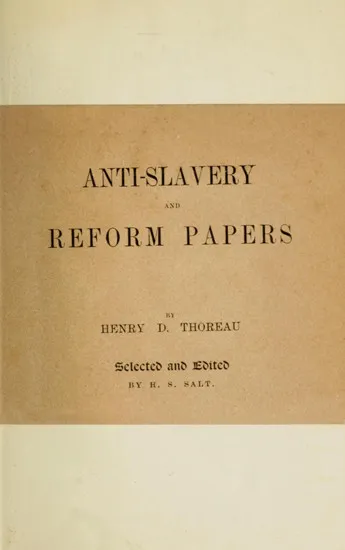
Anti-Slavery and Reform Papers
Henry David Thoreau, Henry S. Salt (Editor)
- Publisher: Swan Sonnenschein & Co., London
- Published: 1890
- Length: 141 pages
- First Edition Reprint
- 1990 Ayer Company Publishers Incorporated, Hardback
Summary
This collection, introduced by Henry S. Salt, brings together some of Henry David Thoreau’s most impassioned writings on social justice, civil disobedience, and personal conscience. Far beyond the idyllic reflections of Walden, these essays reveal Thoreau’s fierce abolitionist convictions, offering readers a glimpse of the man who was not only a naturalist and transcendentalist but also a staunch advocate for individual liberty and justice.
Thoreau’s unyielding stand against slavery and his influential thoughts on civil disobedience are masterfully presented in this volume. With pieces like his iconic “Civil Disobedience” and his fiery defence of John Brown in “A Plea for Captain John Brown,” Thoreau’s writings resonate with the urgency of his time and the moral courage needed to confront societal injustices. Salt’s insightful introduction contextualizes Thoreau’s place in the abolitionist movement, shedding light on his personal involvement in aiding fugitive slaves and his philosophical anarchism.
Salt also carefully highlights Thoreau’s complex relationship with society, which has baffled critics for generations. Through these essays, Thoreau’s true character as a solitary, yet deeply engaged citizen comes alive— a man unafraid to defy the state when his conscience demanded it. His defence of personal integrity over societal conformity offers a timeless message that remains as relevant today as it was during the height of the abolitionist movement.
In Anti-Slavery and Reform Papers, readers will encounter a Thoreau committed to reform, advocating for the rights of the individual, and confronting the evils of his age with unwavering conviction. Salt’s selection of works, paired with his thoughtful introduction, makes this volume an essential read for those interested in Thoreau’s radical social and political thought.
Contents
- Introductory note
- Civil disobedience
- A plea for Captain John Brown
- The last days of John Brown
- Paradise (to be) regained
- Life without principle
What the Critics Said
“In a self-respecting society the task of dealing with a book in which anarchism is asserted as the ideal of the future, would be allotted to the common hangman.”—National Observer